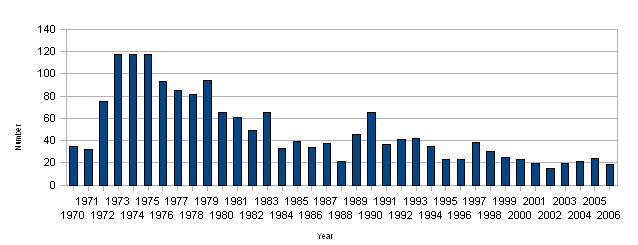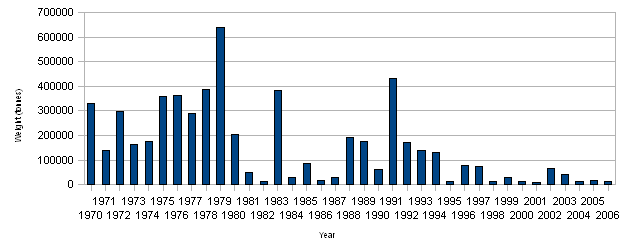Overview of oil spills events from 1970 to 2000
Current state
An oil spill is the release of a liquid petroleum hydrocarbon into the environment – usually ocean or coastal waters – as a result of human activity, which may be intentional or not. Oil can refer to many different materials, including crude oil, refined petroleum products, such as gasoline or diesel fuel, or by-products, ships' bunkers, oily refuse or oil mixed in waste.
During the 1970's, as it is shown on figures 1 and 2 which represent trends in the number and volume of oil spills worldwide for the past 35 years, the tanker spills were quite frequent and involved high amounts of pollutants. Thus, the average number of oil spills per year during the 1970s was approximatively 3 times that for the two next decades and 6 times the average number for the beginning of the 21st century. The main reason which is given for this evolution is the birth in the 1970s and 1980s of new preventive measures and regulations in the framework of the International Maritime organisation and national legislations. The major ones are MARPOL 73/78, the International convention for the safety of life at sea in 1974 and the United Nations convention on the law of the sea, entered into force in 1994.
One has also to notice the fact that the total amount of oil spills estimated for a year is mainly due to a very low number of major events. Although 85% of the total number of oil spills fall into the smallest category (less than 7 tonnes), their contribution to the cumulative amount of pollution in the year is relatively low compared to a major event, such as the sinking of the Erika in 1999 or the Atlantic Empress in 1979 when 276,000 tonnes of oil were poured off the South American coast in less than two weeks.
In Europe, the higher number of oil spills are observed in the United Kingdom, the Netherlands, Germany and Sweden, with about 80 oil spills in the past 35 years in the UK, 40 in the Netherlands, 30 in Sweden and 25 in Germany. Those high figures follow precisely the itinerary of tankers coming from Russia through the harbours of Murmansk, Primorsk and Novorssiysk and heading to Northern and Western Europe where oil is exported. Their roads go through the Baltic, North Sea and the English Channel which become high trafic maritime ways, thus seeing the risk of spillage in their areas beeing considerably raised.
Costs of oil spills
A basic evaluation of the trend of the total cost of oil spills recovery can be made through data from the IOPC funds, three intergovernmental organisations which provide compensation for oil pollution damage resulting from spills of persistent oil tankers in the member states. Figure 3 shows the total cost of oil pollution damage supported by the 1971 fund from 1979 to 1997. These figures shall be considered carefully since the number of member states increased during this period: with 19 members in 1979, the 1971 fund had 75 members in 1975. Furthermore, the increase in total cost does not mean that the number or gravity of disasters raised over time, but is partly a consequence of a higher vulnerability in exposed zones, with more populated regions and a higher concentration of expensive technological goods.
All those facts make it quite difficult to analyse the trends of costs shown on figure 3. Nevertheless a general observation which can be made is that the overall cost of oil pollution recovery in the world has been constantly raising in the past few years, from 20 million dollars in the 1970's to an average 100 million dollars in the 1990's. Thus the issue of oil pollution mitigation has never been as relevant as today, even if the number of oil spills is lower than in the previous decades.
References
The International Tanker Owners Pollution Federation Limited (ITOPF) 2007 : https://www.itopf.org/
Catherine J. Grey – The cost of oil spills from tankers : an analysis of IOPC fund incidents – International Oil spill conference 1999
Centre de documentation, de recherche, et d'expérimentation sur les pollutions accidentelles des eaux (CEDRE) : http://wwz.cedre.fr/en
See also
- Environmental risk assessment of marine activities
- North Sea pollution from shipping: legal framework
- Oil spill pollution impact and recovery
- Case study risk analysis of marine activities in the Belgian part of the North Sea
Please note that others may also have edited the contents of this article.
|


